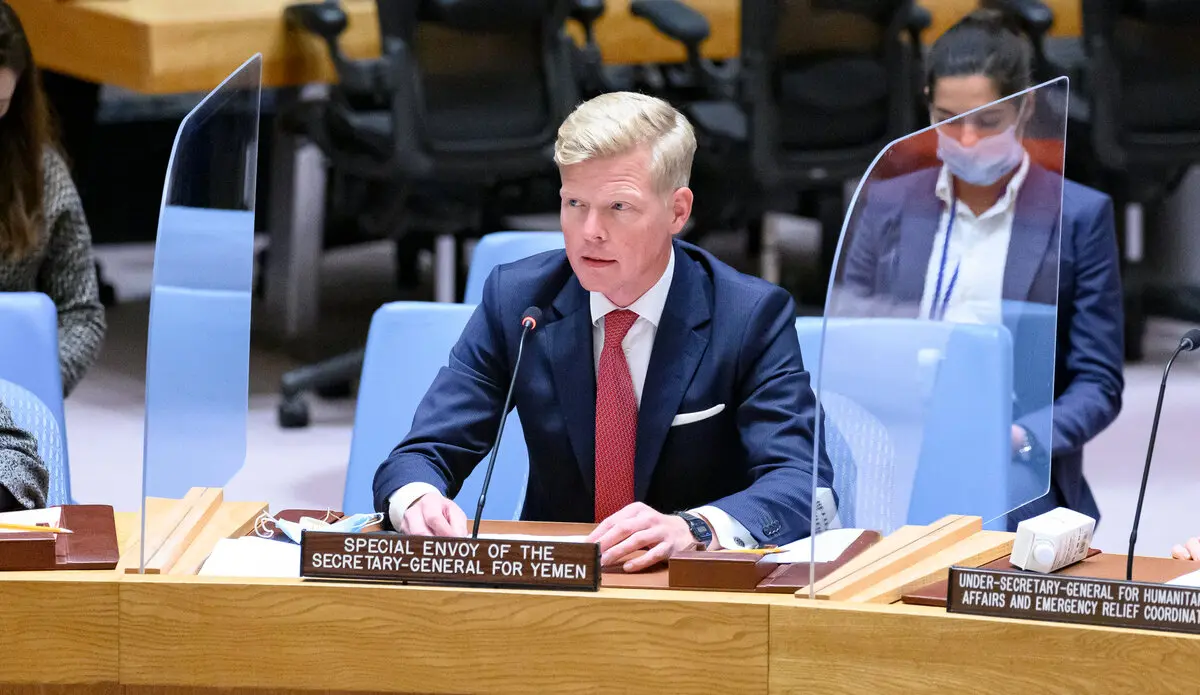
Mwatana valued the efforts of the UN Envoy and All Involved Parties to End the War

Mwatana for Human Rights warmly embraced the declaration made by the UN Secretary-General's Special Envoy to Yemen, Hans Grundberg, regarding the pivotal agreement brokered among conflicting parties in Yemen. This landmark agreement pledges a series of critical actions: instituting an extensive ceasefire spanning Yemen, elevating living standards, ensuring the disbursement of all public sector salaries, reactivating oil exports, facilitating access by opening key routes in Taiz and other regions of Yemen, progressively easing restrictions on Sana'a airport and Hodeidah port, and enacting confidence-building measures. These concerted efforts lay the groundwork for a UN-facilitated, inclusive political process aimed at forging a durable and enduring peace in Yemen.
Expressing wholehearted support, gratitude, and endorsement, Mwatana for Human Rights stood firmly behind the UN envoy's tireless initiatives and applauded all endeavors aimed at terminating the conflict and establishing an inclusive, equitable, and sustainable peace in Yemen.
Mwatana for Human Rights emphasized that halting the war and progressing towards a comprehensive political settlement is the most effective pathway to alleviate the suffering of millions of Yemeni civilians. The conflict, which has persisted for nearly nine years, has deeply impacted various facets of their lives, manifested through numerous forms of violations and hardships. This prolonged armed conflict has resulted in the deaths and injuries of thousands of civilians, widespread and immeasurable destruction of infrastructure, as well as civilian and service objects. It has transformed the lives of millions into a harrowing ordeal of suffering, hunger, and displacement.
Mwatana urged all parties, along with the international community, to prioritize human rights issues. This includes addressing cases of human rights violations, providing redress for the victims, holding perpetrators accountable, and establishing safeguards to prevent the recurrence of such violations. This emphasis on human rights stands as a paramount priority throughout the upcoming stages of the settlement process, serving as a pivotal avenue for the success of a comprehensive, fair, and sustainable peace.
Mwatana for Human Rights emphatically urged all parties to shoulder the historical responsibility by seizing this crucial opportunity and prioritizing the lives and rights of millions of Yemeni men and women above all else. This prioritization should serve as a guiding compass throughout the forthcoming stages of the peace process. The organization underscored that the arduous aftermath of nine years of war demands collective dedication to ensure the success of the peace process and translate it into tangible measures and actions that positively impact the lives of millions of Yemenis across all regions of Yemen.
Radhya Al-Mutawakel, Chairperson of Mwatana for Human Rights, stated, "Ending the war in Yemen and achieving a fair, comprehensive, and sustainable peace settlement for the prolonged conflict will not just signify a significant shift for the lives of millions of Yemenis and the stability of their country; it will also constitute a pivotal transformation for the security of nations and communities within the region and globally. Therefore, it's imperative for the Yemeni parties to engage in this process with goodwill, openness, and positivity, ensuring its success and alleviating the suffering of millions of Yemenis, reigniting hope for the resurgence of peace and security in their lives. Similarly, this responsibility extends equally to all regional parties and the international community."
Mwatana stressed that millions of Yemenis, notably women, children, and vulnerable groups—comprising the overwhelming majority and enduring the harshest brunt of the war—are deeply engaged in and profoundly affected by the direction and results of the peace process. They eagerly anticipate its progress, yearning for an end to the conflict that has weighed heavily upon them, aspiring to secure a future of safety and envisioning a brighter tomorrow for themselves and their children.